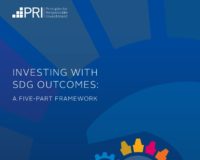
Bron
UN PRI
The United Nations-supported Principles for Responsible Investment (UN PRI) released a new report on Investing with SDG Outcomes providing signatories, including investors representing $100 trillion in assets under management, with a new high-level framework of investor actions to shape outcomes in line with the UN’s SDGs.
The Principles for Responsible Investment (PRI) report lays out how investors shape both positive and negative outcomes of pressing global issues such as human rights abuses, climate change and social inequality. The report argues that investors can look beyond financially material environmental, social and governance (ESG) issues, and consider taking on societal and environmental issues on a systemic level as part of their investment strategies, and wider collaborative actions, to support achievement of the SDGs by 2030.
“Even before the incredible market shocks precipitated by the COVID-19 pandemic, the investment world had been committing to actionable steps to achieve the Sustainable Development Goals,” said PRI CEO Fiona Reynolds. “With the release of this report, the PRI will continue to support its signatories to create mutually beneficial outcomes for their investors and key stakeholders and marks a step forward in moving investors towards greater accountability to the UN Sustainable Development Goals.”
The framework from the PRI highlights that investors can use key levers including investment decisions, stewardship of investees, and engagement with key stakeholders to shape outcomes in line with the SDGs – and the critical role for collective action.
Junko Nakagawa, President & CEO, Nomura Asset Management Co., Ltd., a PRI signatory, commented: “It is clear that large asset managers have a crucial role to play in supporting outcomes in line with the SDGs through both investment in equities and engagement with publicly listed companies. Whilst we recognize the difficulties associated with pursuing impact through public investing for certain SDGs targets, large public companies are among the most important stakeholders for achieving success. These companies have the resources, scale and investment power to bridge the huge funding gaps, while major asset managers are uniquely positioned to engage with these companies and help to enhance their impact. Nomura Asset Management is committed to finding solutions that maximize our contribution to outcomes in line with the SDGs.”
Notably, the report details a spike in the number of PRI signatories that have mentioned SDGs in their reporting to PRI, with 31% of signatories (650) now mentioning the SDGs in 2020, up from 24% last year and 16% in 2018. Diving into specific examples, the report outlines case studies of PRI signatories seeking to shape outcomes in line with the SDGs. Investment Managers such as Actis in the United Kingdom have developed in-house tools to identify, measure and monitor the positive social and environmental outcomes of their investments. UK-based Aviva Investors applies an ESG-balanced scorecard approach to analyse proposed real assets transactions, complemented by an impact overlay to consider a project’s potential contribution to the SDGs.
The PRI will officially update its reporting framework in January 2021 to include initial questions about policies on shaping real-world outcomes and processes used for identifying outcomes related to the SDGs. Next steps for the PRI will include working with those signatories that are seeking to shape outcomes in line with the SDGs, to support sharing of best practices and to develop consensus on how to address common challenges.
Darryl Murphy, Managing Director, Infrastructure at Aviva Investors, a PRI signatory, commented: “As long-term investors, we believe infrastructure – and real assets more broadly – has a critical role to play in moving towards a truly sustainable future. As such, the UN’s Sustainability Development Goals (SDGs) are an essential layer of our investment framework in assessing whether an asset will have a positive environmental and social impact. They help us to define objectives for a project and shape terms and conditions of an investment agreement, ensuring that borrowers adhere to certain practices and standards over the long-term. Whilst infrastructure development is itself one of the 17 SDGs, almost half of all SDGs will not be met without infrastructure playing a critical role. As investors in the asset class, we feel it’s critical to be fully-aligned with them and to use them as a point of reference to determine how our investments contribute to outcomes that are consistent with those goals.”
Eva Halvarsson, CEO of AP2, a PRI signatory, commented: “AP2 welcomes the Investing with SDG Outcomes paper and hopes that it will both inspire and contribute to a more comprehensive dialogue about the SDGs and on human rights issues in the finance industry. In the report, you may read about AP2’s work on assessing human rights risks and the challenges we encountered. By sharing insights and providing tools, the paper becomes a handy framework for investors looking to address SDG issues.”



